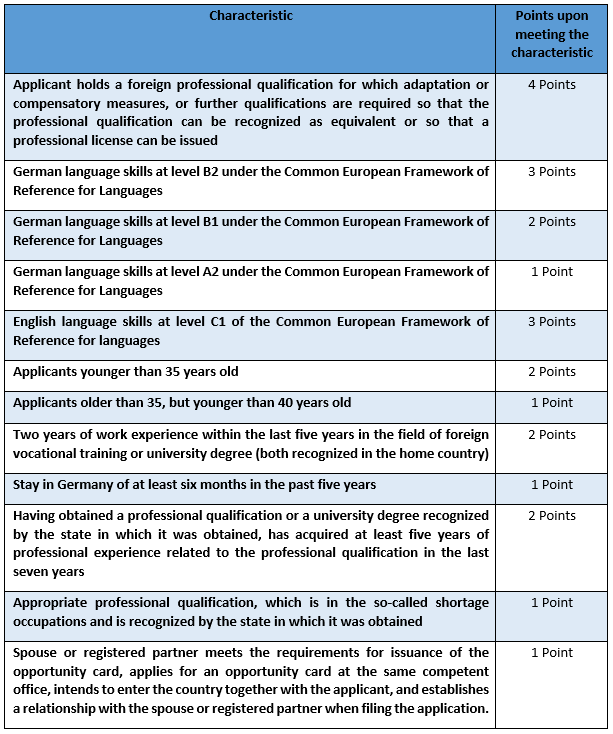
Country / Territory
Related contacts

Related offices
Related contacts

Related insights
Related offices
Related contacts

Related insights
Related offices
By: Ruben Fiedler
Securing and expanding a good skilled labour market base for companies and businesses in Germany is crucial for innovation and performance on the path to a functional economy. A skilled worker base is also essential to address foreseeable changes in the labour market.
As an essential element of the German labour market, the German immigration system is closely linked to the strength of the economy. For this reason, the German federal government has created new immigration framework conditions to maintain and expand a system for securing skilled workers in the future. Another element of this system is the so-called “Opportunity Card.”
The fourth and final blog of this series focuses on the new regulations of the Opportunity Card, also known as the “Chancenkarte.” For further information regarding other changes related to the German Residence Act, review the previous installments in the series focused on employees and employers, students and family reunions.
The Opportunity Card: Points-based system for job-seekers
A new job seeker permit will be introduced to allow applicants to look for a job in Germany.
The new permit is expected to apply to foreign professionals with recognized vocational training or university degrees and to foreign nationals with at least six points, according to a new points-based system.
The Opportunity Card will entitle the holder to work a maximum of 20 hours per week and to work a trial work period of no more than two weeks. In each case, the employment must be qualified, aimed at training or suitable for inclusion in a measure for the recognition of foreign professional qualifications.
The Opportunity Card is initially issued for a period of up to one year ("Search Opportunity Card"). The Card can be extended for up to two years as such if the person has an employment contract or a binding job offer for a qualified job in Germany and the German authorities have approved it ("Follow-up Opportunity Card"). The Follow-up Opportunity Card is issued only if the person does not meet the requirements for the issuance of another residence permit for work purposes.
However, the Opportunity Card may only be issued if the livelihood is secured. Livelihood assurance is determined by the authorities on a case-to-case basis. Livelihood is considered secure if the employee can fully cover their own costs—including sufficient health insurance coverage—without recourse to public funds. The means of subsistence must be guaranteed in the long-term; there must be a reliable influx of funds, and it must be possible to forecast this positively. This can also be proven, for example, with evidence of sufficient financial resources, such as bank statements.
Allocation of points based on the Opportunity Card
If the applicant is not a skilled worker recognized in Germany with a recognized degree or vocational training, they must reach enough points for the Opportunity Card to be issued.
The points are awarded for certain criteria. The system of the Opportunity Card is based on qualifications, language skills, work experience, connection to Germany and age. The minimum score is six points.
The characteristics and points can be best summarized in a chart:

For individuals with a foreign vocational qualification of at least two years' duration or a university degree, the opportunity card for job-seeking will be an excellent instrument for effective integration into the German labour market.
Since the Opportunity Card also offers the possibility of performing trial work, the labour market will be broadly opened. The change to residence permits for gainful employment or educational purposes is guaranteed. The aim of this is also to attract new qualified employees to the German labour market who have not been able to seek employment in Germany in the past.
It is planned on the part of the federal government that the regulations of the Opportunity Card will come into force 10 months after the other updated regulations come into force. This transitional period will be necessary for the German authorities to prepare for the implementation of the new regulations.
Need to know more?
For further information and advice on the Opportunity Card and its regulations, please contact Senior Associate Ruben Fiedler at [email protected].
This blog was published on 16 August 2023, and due to the circumstances, there are frequent changes. To keep up to date with all the latest updates on global immigration, please subscribe to our alerts and follow us on LinkedIn, Twitter, Facebook and Instagram.
Country / Territory
Related contacts

Related offices
Related contacts

Related insights
Related offices
Related contacts

Related insights
Related offices
Explore more at Fragomen

Video
Partner Diana Quintas outlines key early career visa pathways and practical considerations for employers and graduates navigating entry-level immigration options.

Fragomen news
The Montreal office has added Partner Julie Lessard and Counsel Elsa Agostinho and Sophia Khanzadian to strengthen its immigration services.

Blog post
Destination Services Director Christine Sperr examines how housing market reforms, rent stabilization measures and cost-of-living dynamics in Saudi Arabia are influencing workforce mobility, compensation planning and long-term settlement strategies under Vision 2030.

Blog post
Manager Dr Adela Schmidt and Senior Associate Isabel Schnitzler analyse the European Commission’s infringement proceedings against Germany concerning its Vander Elst visa requirements for third-country nationals providing short-term cross-border services and explain why current compliance obligations remain unchanged.

Blog post
Latin America & the Caribbean Managing Partner Leonor Echeverria, Senior Associates Sarah Blackmore and Sonya Cole and Senior Regional Knowledge Manager Laura Weingort examine renewed energy interest in Venezuela and outline key immigration pathways, procedural constraints and strategic considerations for compliant talent deployment.

Media mentions
Senior Manager Andreia Ghimis highlights how the EU’s new migration strategy could create opportunities for employers while increasing compliance requirements.

Awards
Partner Julia Onslow-Cole is recognised in the Spears 500 guide to leading private client advisers, reflecting her experience advising high-net-worth individuals, families and global businesses on complex UK and European immigration and mobility strategies.

Media mentions
Partner Abeer Al Husseini discusses increased scrutiny of Saudi business visas in AGBI, highlighting stricter review of short-term entry used for operational work and the implications for regional employers.

Awards
Australia and New Zealand Managing Partner Teresa Liu, Partner Charles Johanes, Practice Leaders Hedvika and Leader Ben Lear and Senior Associate Hannah Scanlan are recognized in the 2026 edition of Doyle’s Guide as leading immigration practitioners in Australia.

Awards
Fragomen is ranked Band 1 for Immigration: Business in the Chambers Global 2026 Guide, marking two decades of recognition since 2006. The firm is also the only firm ranked Band 1 in the Global: Multi-Jurisdictional Immigration category and receives additional individual recognitions in the USA: Business Immigration rankings.

Media mentions
Partner Rick Lamanna provides insight to Buffalo Toronto Public Media on potential IRCC processing challenges as Canada prepares for increased visa demand ahead of the 2026 FIFA World Cup.

Video
Partner Diana Quintas outlines key early career visa pathways and practical considerations for employers and graduates navigating entry-level immigration options.

Fragomen news
The Montreal office has added Partner Julie Lessard and Counsel Elsa Agostinho and Sophia Khanzadian to strengthen its immigration services.

Blog post
Destination Services Director Christine Sperr examines how housing market reforms, rent stabilization measures and cost-of-living dynamics in Saudi Arabia are influencing workforce mobility, compensation planning and long-term settlement strategies under Vision 2030.

Blog post
Manager Dr Adela Schmidt and Senior Associate Isabel Schnitzler analyse the European Commission’s infringement proceedings against Germany concerning its Vander Elst visa requirements for third-country nationals providing short-term cross-border services and explain why current compliance obligations remain unchanged.

Blog post
Latin America & the Caribbean Managing Partner Leonor Echeverria, Senior Associates Sarah Blackmore and Sonya Cole and Senior Regional Knowledge Manager Laura Weingort examine renewed energy interest in Venezuela and outline key immigration pathways, procedural constraints and strategic considerations for compliant talent deployment.

Media mentions
Senior Manager Andreia Ghimis highlights how the EU’s new migration strategy could create opportunities for employers while increasing compliance requirements.

Awards
Partner Julia Onslow-Cole is recognised in the Spears 500 guide to leading private client advisers, reflecting her experience advising high-net-worth individuals, families and global businesses on complex UK and European immigration and mobility strategies.

Media mentions
Partner Abeer Al Husseini discusses increased scrutiny of Saudi business visas in AGBI, highlighting stricter review of short-term entry used for operational work and the implications for regional employers.

Awards
Australia and New Zealand Managing Partner Teresa Liu, Partner Charles Johanes, Practice Leaders Hedvika and Leader Ben Lear and Senior Associate Hannah Scanlan are recognized in the 2026 edition of Doyle’s Guide as leading immigration practitioners in Australia.

Awards
Fragomen is ranked Band 1 for Immigration: Business in the Chambers Global 2026 Guide, marking two decades of recognition since 2006. The firm is also the only firm ranked Band 1 in the Global: Multi-Jurisdictional Immigration category and receives additional individual recognitions in the USA: Business Immigration rankings.

Media mentions
Partner Rick Lamanna provides insight to Buffalo Toronto Public Media on potential IRCC processing challenges as Canada prepares for increased visa demand ahead of the 2026 FIFA World Cup.


